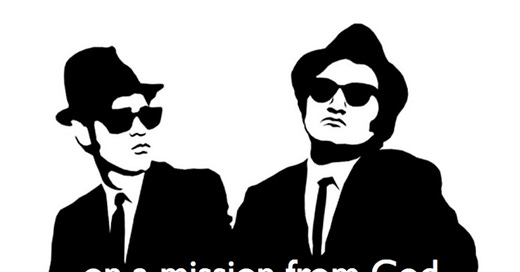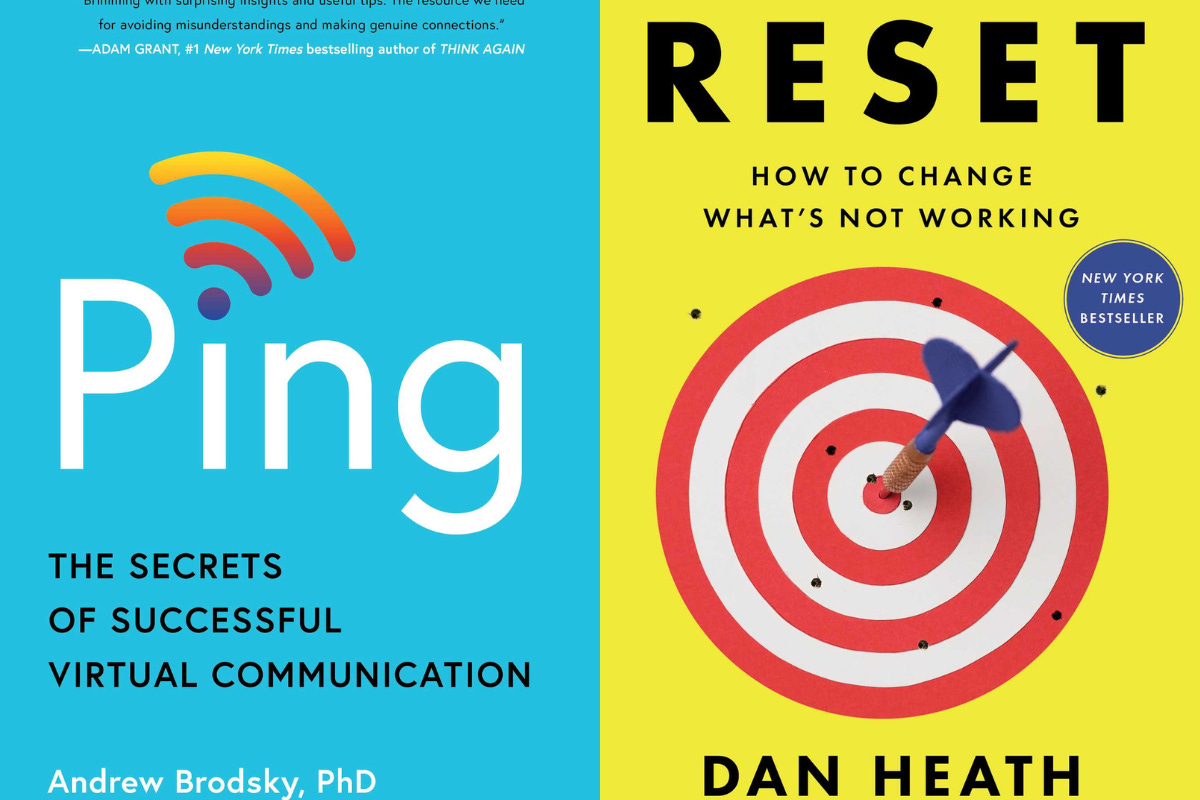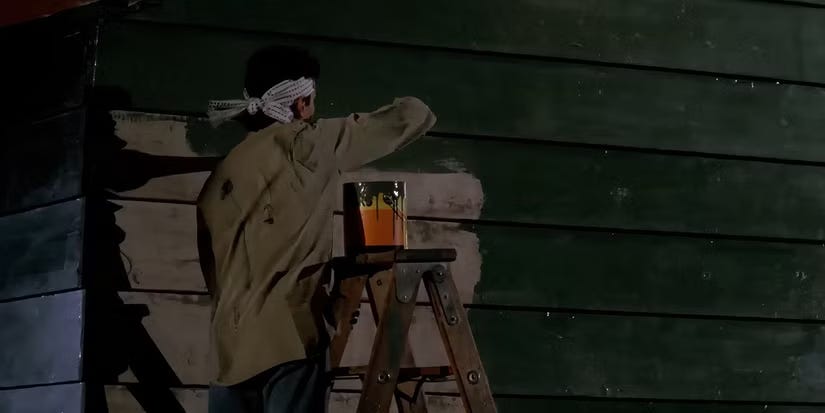🚀 Breaking News: The Fog Is About to Lift!
I'm on a mission from God (kind of). My March highlights.
March was a whirlwind—books, planes, amusement parks, classrooms, podcasts, and yes… fog.
The highlight? I signed a deal with Wiley to publish my second book: The Fog of Work: Finding Traction in the Middle of Volatility, Uncertainty, Complexity, and Ambiguity. If all goes according to plan, I’ll turn in the manuscript this August, and it’ll hit shelves next spring or summer.
I know that feels like a long way off, but as a loyal Beyond the Obvious subscriber, you’ll get plenty of sneak peeks along the way. In fact, I’m sharing a short version of the book’s introduction at the end of this email.
March Reads & Ratings…
I finished up two books this month.
Reset - Dan Heath (⭐️⭐️⭐️⭐️)
Dan Heath’s sequel to Switch (which I rated ⭐️⭐️⭐️⭐️½ back in 2020). No one writes about change better than Dan Heath. No one. He’s officially replaced John Kotter as the go-to voice on navigating change. He gets that emotion is what makes change so difficult. Switch and Reset are the modern guidebooks every leader needs.
Ping – Andrew Brodsky (Kindle) (⭐️½)
This one had promise—a research-based look at virtual communication in the workplace, highly recommended by Adam Grant. But in my opinion, it didn’t deliver. The biggest issue? It was too long. Valuable insights were buried under long stories and too many examples. The bullet point summaries at the end of each chapter? That’s really all you need.
Where I traveled…
March was an unusually busy travel month:
Two trips to Houston, TX to facilitate two-day workshops with clients
A spring break getaway with the family to Walt Disney World in Orlando, FL (the new Tron rollercoaster did not disappoint!)
A quick trip to Denver, CO to deliver a keynote for AMEX Global Business Travel
And one more two-day workshop in Decatur, AL
Most Popular Podcast Episode…
This month’s most popular episode was on giving challenging feedback (even when you’d rather not). Unsurprisingly, the 3IQ System we discussed has also been one of the most requested topics in my live workshops over the past year.
“Smash that like & subscribe button!”
Subscribe to the How to Lead YouTube Channel.
Subscribe to my YouTube Channel (where I post Shorts from each episode).
What I taught…
Lots of classroom time this month, covering topics like:
How to be optimistic (without faking it)
The 3IQ System for giving feedback (when you’d rather not)
Handling big emotions to small feedback
Communication habits of effective leaders
Finding traction in the middle of volatility, uncertainty, complexity, and ambiguity
If any of these resonate, I’d love to discuss how they could support your team.
Insights on Common Work-Life Challenges…
Why this book, and why now?
I don’t know any other way to say it, so I’ll channel my inner Blues Brothers and say it straight:
I’m on a mission (from God?) to bring dignity back to middle management.
(And yes, I’m saying that with a smirk.)
Believe it or not, being a middle manager used to be cool. For years, it was a respected role—an honorable place to land in your career. It came with status, influence, and pride.
Then, on April 16, 1989, everything started to change. That’s when Scott Adams published the first Dilbert cartoon, and the slow assault on middle management began.
From there, the hits kept coming:
The infamous 1999 Monster.com Super Bowl commercial (“When I grow up, I want to climb my way up to middle management…”)
The cult classic Office Space
The Office (UK in 2001, US in 2005)
The Devil Wears Prada
Horrible Bosses
…and on and on.
What used to be a badge of honor became the punchline.
But we shouldn’t be surprised. Popular culture has always taken shots at authority. Television and movies have a long history of celebrating the “charming rebel”—those characters who roll their eyes at rules and mock authority figures and the idea of doing the right thing.
Think:
Fonzi on Happy Days
Vinne Barbarino on Welcome Back Kotter
Bart Simpson on The Simpsons
Zack Morris on Saved by the Bell
Kelso on The ‘70s Show
Ferris Bueller in Ferris Bueller’s Day Off
Jack Sparrow in Pirates of the Caribbean
The Dude from The Big Lebowski
These characters are wildly entertaining. But in real life, charming rebels like that don’t inspire—they erode. They are really like snakes in the grass looking to attack hard-working do-gooders.
And right now? Middle managers are not doing well.
The headlines tell the story:
Middle Managers Have It Bad: 5 Things They Need Most (Forbes)
This Type Of Employee Is The Most Likely To Burn Out At Work (HuffPost)
Capterra’s 2023 Middle Manager Survey found 71% of middle managers are feeling overwhelmed and stressed all the time.
Managers Are Burned Out. Here’s How to Help Them Recharge (HBR)
Manager Burnout Is Only Getting Worse (Gallup)
And guess who’s noticing? Gen Z.
Conscious unbossing: why gen Z are refusing to become managers (The Guardian)
Millennials & Gen Z Aren’t Interested in Management (PCBB)
Why People Don’t Aspire To Be Managers In Today’s Workforce (Forbes)
It’s a shame. And it matters—for two big reasons.
First, in The Captain Class, Sam Walker describes how elite teams are often held together by a “quiet cornerstone.” Not always the star. Not always the most popular. But always the glue. That’s what middle managers are. They’re the captains—not just of teams but of the global economy. Without them, nothing of value gets done.
Second, middle management isn’t something to endure—it’s a rite of passage.
Giving up during this stage would be like Daniel LaRusso quitting on Mr. Miyagi halfway through painting the house. It might have felt pointless then, but it wasn’t busywork. It was training. It was transformation.
As Miyagi says, “Everything is not as it seems.”
If Daniel had walked away, he would’ve missed the point entirely. The same is true for middle management. This is a rite of passage where a middle manager develops what Dr. Martin Seligman calls “earned prestige.”
Right now, middle managers are under attack. They’re disoriented, discouraged, and burned out. In military terms, they’re experiencing the fog of war.
They may not be on a battlefield, but their day-to-day is just as chaotic and unclear.
So I’m calling it what it is: The Fog of Work.
There is a way through the fog—and I’m excited to share the way through with the world.
P.S. I’d love to hear your thoughts on any of these sneak peeks—reactions, questions, encouragement, constructive feedback—I’m all ears!










